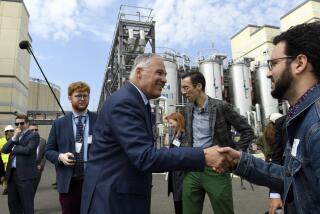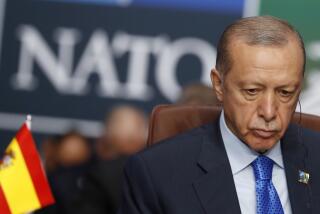Russia Will Not Sign the Kyoto Treaty
- Share via
MOSCOW — Russia will not ratify the Kyoto Protocol limiting greenhouse gas emissions, a top Kremlin aide said Tuesday, driving another stake into the landmark environmental pact.
“It is impossible to take on obligations that impose substantial restrictions on economic growth in the country,” presidential economic advisor Andrei Illarionov told reporters, echoing Bush administration arguments when it rejected the pact two years ago. “Of course, in its current form, this protocol cannot be ratified.”
Illarionov made his comments after Russian President Vladimir V. Putin met with Russian and European industrialists here. Moscow’s position on the Kyoto treaty was announced to that meeting, he said, according to a report by the Russian news agency Interfax.
Forged in Japan in 1997, the pact has been ratified by 119 countries. It sets targets to reduce so-called greenhouse gas emissions by an average of 5.2% below 1990 levels by 2012.
To enter into force, the treaty requires approval by countries responsible for 55% of industrialized nations’ emissions. With the United States and some other countries having already rejected it, that target cannot be met without Russia’s participation.
Opposing the Kyoto treaty could bring some political and economic benefits to Russia. The move puts it and the United States on the same side of an issue, which the Kremlin may see as a welcome return to shared interests after the strains of disagreement over the Iraq war.
The move could also help attract foreign capital from sources eager to fund businesses that do not face environmental restrictions.
Participants at the round- table conference also discussed terms for Russia’s admission to the World Trade Organization, and some analysts said Illarionov’s declaration may indicate that Moscow is trying to use the Kyoto Protocol as a bargaining chip in negotiations with the European Union over WTO entry terms.
However, there could be potential penalties since the announcement puts Russia at odds with most of the rest of the world, which backs the Kyoto treaty.
“If such a decision has in fact been made, it is rather surprising, for the aftermath of such a decision is obvious to everybody: What Illarionov is urging is fraught with the self-isolation of Russia as a state,” said Sergei V. Vasilyev, head of the recently formed National Carbon Union, a partnership of leading Russian businesses that advocates ratification.
“The consequences of this will be more than dismal. Should Russia fail to ratify the protocol, it will vividly demonstrate to the rest of the world that it is ignoring a sphere that has been becoming more and more significant in the eyes of the world community over the past few decades, namely being concerned with global issues and bearing responsibility for planetary processes,” he said.
The Kyoto treaty was designed to slow global warming by reducing air pollution, particularly carbon dioxide, which many scientists believe creates a greenhouse effect. The Bush administration pulled out of the agreement in 2001, citing potential harm to the U.S. economy if companies were compelled to cut such emissions.
Illarionov has been a vocal opponent of Moscow’s ratification of the treaty, and Russia’s economic minister suggested this summer that Putin hold out on it until Russia is guaranteed WTO membership.
In his comments to reporters, Illarionov also denounced European Union pressure on Russia to raise its domestic natural gas prices to international market levels as a condition of WTO entry, something Moscow argues would unfairly eliminate one of the country’s natural competitive advantages.
Viktor Danilov-Danilyan, a former ecology minister now at the Russian Academy of Sciences, said he believed different factions within the Russian government still have differing views on whether to ratify the treaty.
“It is not really clear whether Illarionov’s statement means that the ratification of the Kyoto Protocol will be effectively blocked,” Danilov-Danilyan said. “Of all the possible reasons for Mr. Illarionov’s surprising statement, bargaining appears to be the most likely one.”
Danilov-Danilyan said that if the intent was to negotiate with the European Union over terms for WTO entry, he believed Russia would be better off stating its intent to ratify the Kyoto Protocol and then bargaining openly over what it would get in return.
Uncertainty over Moscow’s commitment to the treaty has been growing ever since Putin spoke at a climate change conference in Moscow in September, when he said that Russia was “carefully examining” whether to ratify the treaty. The decision would be made in the country’s national interests, he added.
Putin then sent a chill through his listeners by declaring: “In Russia, you can often hear, either jokingly or seriously, that Russia is a northern country. If it were two or three degrees warmer, this would be no big deal. Maybe it would even be a good thing -- we would spend less money on fur coats and other warm items. Specialists on agriculture say: The grain harvest is increasing.”
Putin, who often displays a sardonic sense of humor, appeared in part to be teasing his audience, and he went on to discuss the negative aspects of climate change. But he left his listeners unsure of Russia’s position.
The protocol allows for the sale of emissions-reduction “credits.” Russia has long been viewed as likely to find it easy to surpass the Kyoto requirement, thereby generating such credits.
If this were to happen, the nation could earn billions of dollars by selling those credits to countries that cannot fully meet their own emissions-reduction targets.
This is one reason why Moscow had been generally expected to ratify the treaty.
But some Russian analysts say rapid growth in recent years may mar the financial prospects.
*
Alexei V. Kuznetsov of The Times’ Moscow Bureau contributed to this report.
More to Read
Sign up for Essential California
The most important California stories and recommendations in your inbox every morning.
You may occasionally receive promotional content from the Los Angeles Times.










